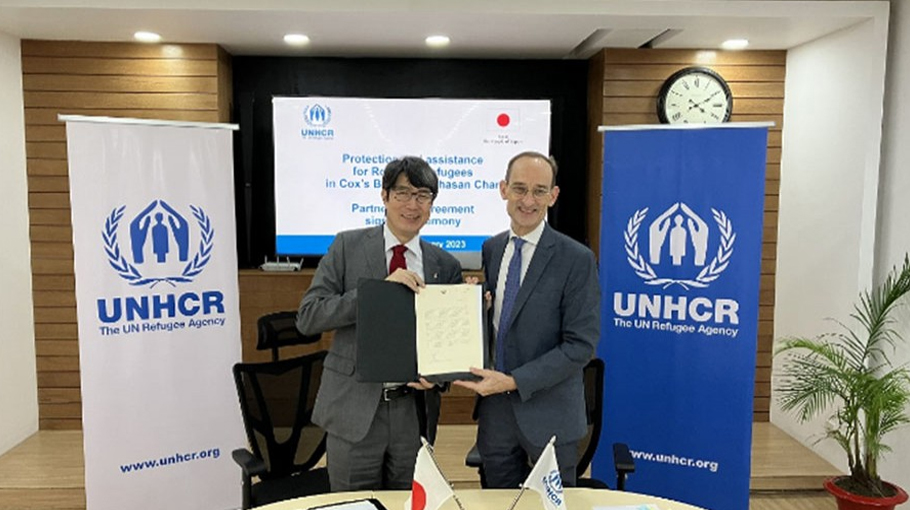Japan, UNHCR sign $4.5m deal to help Rohingyas

The government of Japan and UNHCR, the UN Refugee Agency, signed on Wednesday a new partnership agreement for the continuous provision of essential protection interventions and humanitarian assistance to Rohingya refugees in Bangladesh.
The contribution of USD 4.5 million [JPY 600 million] will strengthen lifesaving and life-sustaining services and support enhanced resilience and self-reliance of refugees and Bangladeshis in Cox’s Bazar and on Bhasan Char.
"This new contribution from the Government of Japan for some of UNHCR’s essential protection and assistance programs as well as livelihood activities in the camps in Cox’s Bazar and on Bhasan Char comes at a critical time now that we are facing a looming funding crisis already manifest in reduced refugee access to food”, said Johannes van der Klaauw, UNHCR Representative in Bangladesh.
“Japan is once more at the forefront of supporting UNHCR programmes in Bangladesh. We hope this contribution will also serve as a catalyst for other donors to follow suit”.
“During my visit to Cox's Bazar last month, I was impressed by the use of information technology for the joint management of the registration for Rohingya refugees by the Government of Bangladesh and UNHCR. I was also delighted to witness strengthened livelihood assistance in collaboration with a Japanese company, where Rohingya women produce sanitary goods. We will continue to engage in the solution for a voluntary, safe and sustainable return, and will cooperate with UNHCR and other humanitarian partners to achieve better living conditions for refugees and host communities.” said Iwama Kiminori, Ambassador of Japan to Bangladesh.
“I was also profoundly touched by the tireless activities of the Government of Bangladesh, the UN agencies, and NGOs. I recognized the needs of continuous support for them, and we will commit for that”, he added.
In Cox’s Bazar, the assistance will prioritize access to sanitation and hygiene products, the continued operation and maintenance of WASH facilities as well as significantly develop skill development activities for the Rohingya refugees, aimed at rendering them less dependent of decreasing humanitarian assistance.
Furthermore, Bangladeshi vulnerable women living in the adjacent communities affected by the presence of refugee camps will benefit from the expansion of a centre in Ukhiya that provides skills training to produce various crafts and creates opportunities to generate income.
On Bhasan Char, the Japanese contribution will allow UNHCR to expand and enhance education and livelihood activities to further capacitate refugees in supporting their communities.
The contribution aims at training of larger numbers of Rohingya teachers and facilitators in support of the rollout of the Myanmar Curriculum and allow for the expansion of vocational and other skills training at a jute production centre on the island.
In addition, the funding will support the renovation of two primary health care centres and the Government’s 20-bed-hospital on Bhasan Char, as well as accommodation for medical staff. A new landfill site will support the management of solid waste and an existing plastic recycling project.
The support from Japan is most timely as UNHCR and its partners, along with the Government of Bangladesh, prepare for the launch of the 2023 Joint Response Plan (JRP) for the Rohingya humanitarian crisis.
Since the beginning of the emergency in August 2017, Japan has been a steadfast supporter of the Rohingya refugee response in Bangladesh, contributing over USD 204 million to UNHCR and other UN agencies and NGOs in Bangladesh.




